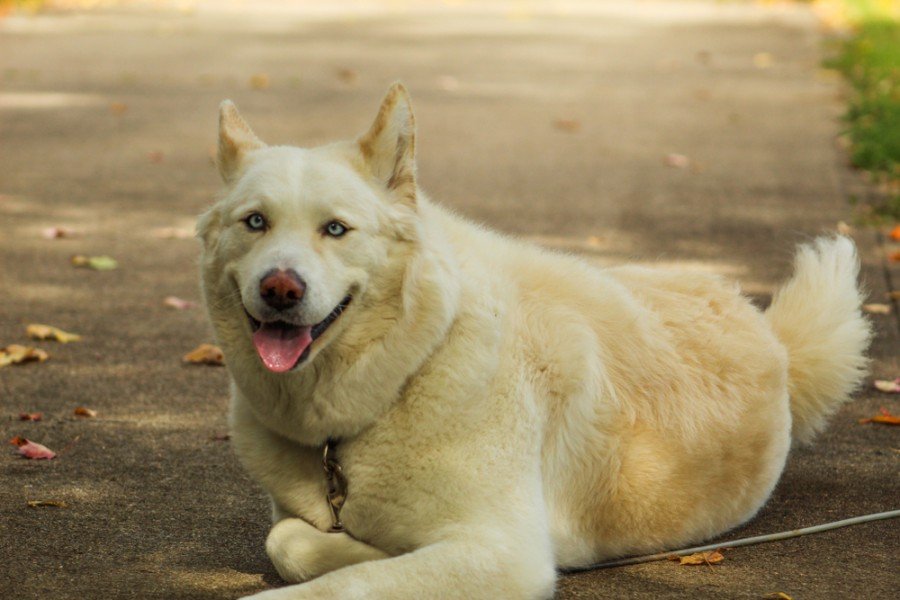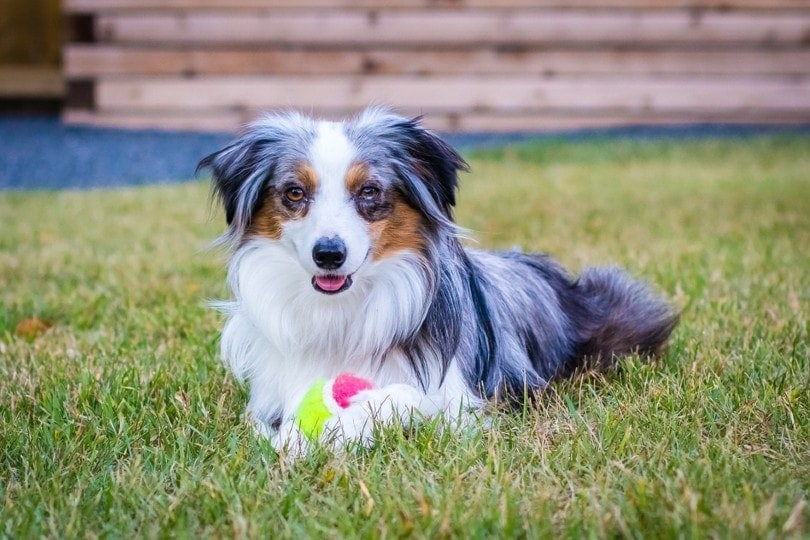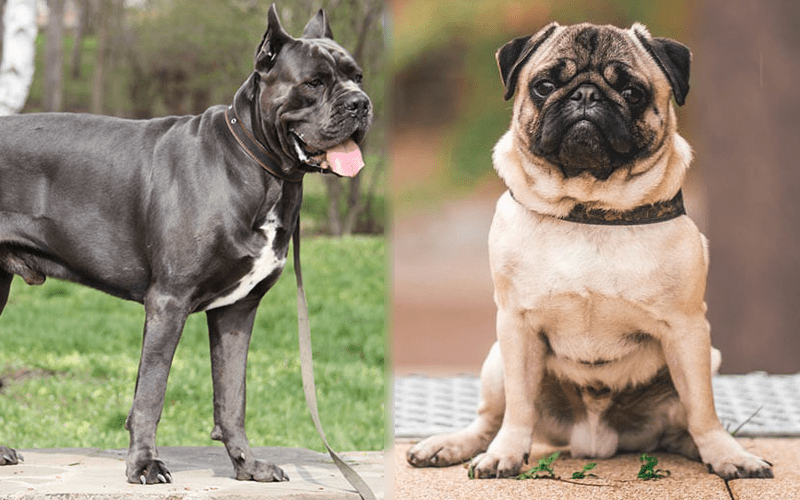Golden Corgi (Golden Retriever & Corgi Mix): Info, Pics, Traits & Facts

Updated on

| Height: | 10-18 inches |
| Weight: | 25-65 pounds |
| Lifespan: | 10-13 years |
| Colors: | Golden, tan, red, white, fawn, black, brown |
| Suitable for: | Families with small children, those looking for an easygoing dog |
| Temperament: | Playful, affectionate, energetic, loyal, cuddly, stubborn |
Golden Retrievers and Corgis are two of the most iconic dog breeds in the world, so it was only a matter of time before someone thought to combine them. The result is the Golden Corgi, a strange but adorable dog that wants to be friends with every pair of knees they come across.
Unlike many designer breeds, the Golden Corgi doesn’t fulfill a need like creating a hypoallergenic pet or solving health problems within the parent breeds. The only reason this breed exists is that someone thought they would be cute — and they weren’t wrong.
Although both parent breeds are well known, most people aren’t familiar with the charming little Golden Corgi. In the guide below, we’ll share all the relevant information that you need to know before you adopt one of these adorable pups.
Golden Corgi Puppies
Even as puppies, Golden Corgis are a strange blend of both parent breeds. They often look like someone took a Golden Retriever’s head and pasted it onto a Corgi’s body. They’re still definitely cute, but it’s an odd combination.
That extends to their personalities as well. Rather than blending the two parent breeds, they seem to lift individual traits from a single parent. For example, they tend to have the amiability of a Golden and the stubbornness of a Corgi.
That may seem like something of a contradiction, but you’ll have to get used to contradiction with the Golden Corgi. That’s what happens when you combine a big dog with a little one, but luckily, it doesn’t detract from their appeal.
As puppies, they’re as energetic and playful as any other young dog that you might meet, although they tend to be a bit clumsier.
They’re also curious and prone to mischief, so you’ll want to make sure anything valuable or poisonous is well-hidden. Be sure to give them plenty of chew toys and keep your shoes on a high shelf as well, as chewed-up shoes are the price you pay for having a puppy.
3 Little-Known Facts About the Golden Corgi
1. You should not get a Golden Corgi if you don’t enjoy playing with dogs.
One thing both breeds have in common is a predilection for playtime. Actually, it’s more than that — it’s something of an obsession.
These dogs can spend hours chasing after balls or Frisbees or even just playing tug-of-war with an old rope. They’re not shy about demanding playtime, and they can be a bit of a pain if they don’t get it.
That makes them wonderful companions for anyone who loves playing with their dog, but if you get bored quickly, you might want to choose a less-demanding breed.
2. They don’t make great guard dogs.
Both parent breeds are sociable and outgoing, the type of dogs who have never met a stranger. While that’s great for your next party, we wouldn’t necessarily trust these pups to protect our valuables.
That’s not to say they won’t bark at intruders, because they might. They’ll just do it from a distance that they deem safe.
3. You never really know what you’re getting from a Golden Corgi.
This breed is new enough that it’s not really established, so the personalities of each individual dog will vary wildly from one pup to the next. Some take heavily after their Retriever parents, others after the Corgi, and some are an equal mix of both.
That means you won’t know what to expect from your Golden Corgi puppy until they’ve had a chance to grow up a bit and show you who they are. It also means you could get a dog that’s more stubborn or hyperactive than you’d like.

Temperament & Intelligence of the Golden Corgi 🧠
The temperament of each dog will depend to a certain extent on the genetic roll of the dice. That being said, there are still general statements that we can make about these pooches.
They are almost always extremely friendly and outgoing, even around strangers. These dogs believe that people were put on this Earth to pet them, play with them, and give them treats — and you’d better not prove them wrong.
They’re not prone to aggression, but if they take after the Corgi aspect of their heritage, they can be extremely stubborn. This can make it difficult to iron out any behavioral problems, so you’ll need to stay on top of their training.
As far as intelligence goes, both Goldens and Corgis are commonly thought to be among the smartest dog breeds, so you’ll likely have a canine Einstein on your hands. They can pick up commands in a hurry, provided that they’re interested in learning.
Of course, they can also turn that high-powered intellect against you if they’re feeling mischievous. You’ll need to stay on top of things like puppy-proofing your home if you bring one of these mutts into it.
Are These Dogs Good for Families? 🏡
Golden Corgis can make excellent family pets, as they’re fun-loving, peaceful, and easy to train. That doesn’t mean that there aren’t a few issues that you need to be aware of beforehand, though.
While these dogs will usually play peacefully with even the smallest of children, their natural exuberance can sometimes cause them to get out of hand. They can easily run right through a toddler, so you’ll want to be sure to supervise any baby/puppy playtime.
Also, Corgis are herding dogs, so if your pup takes after that part of their genetic background, you may find your pooch corralling your kids all over the yard. While that may sound like a good thing, it can quickly get old for the children.
You may need a large family just to keep up with one of these dogs, however. Given their insatiable appetite for play, they may wear out any single person left in charge of tuckering them out, so it’s good to have backups handy.
Ultimately, though, your entire family should fall in love with one of these low-rider pups. Once they slow down (or should we say, if they ever slow down), they’ll curl up in your lap, look at you with their puppy-dog eyes, and melt your heart faster than you ever thought possible.
Does This Breed Get Along With Other Pets? 🐶 😽
Golden Corgis are laidback dogs, and they welcome just about any playmate that comes their way, even if it’s another dog. They’ll never turn down the opportunity to add another friend to their pack.
They’re usually accepting of other animals like cats as well, especially if the Golden Corgi was raised around them. You may have more problems introducing an adult dog to a new cat, but it’s certainly not impossible.
However, beware of those herding instincts. While many children don’t like being herded, cats really don’t like it, and you could have a rodeo on your hands if your kitty decides that they’ve had enough “encouragement” from the dog.
It’s important to socialize your pup as early and often as you can to prevent these kinds of mishaps. While this won’t guarantee that they won’t happen, it will make it easier for you to control problematic behaviors down the line.
Also, if your dog takes after the Corgi side, they may try to dominate other dogs — yes, even much larger ones. This is usually wishful thinking, so there’s rarely aggression that accompanies it, but you should be sure to discourage it all the same.
Things to Know When Owning a Golden Corgi
The Golden Corgi is a fairly easy breed to raise, so it’s a good choice for first-time dog owners. Still, there are several things that you should know about these dogs before you bring one home, as owning one isn’t for everyone.
Of course, given how wildly the personalities of these dogs can vary, everything written below should be treated as a guide rather than as hard-and-fast rules.
Food & Diet Requirements 🦴
You need to be careful what you feed your Golden Corgi and even more careful how much you feed them. If they overeat and fail to get all the activity they need, these pups can quickly become obese, and obesity is horrible for dogs.
We recommend feeding them a high-protein kibble, as this will give them plenty of energy while keeping them long and lean. High-quality meat should make up the bulk of the food, and the first ingredient should be a lean meat source of some kind.
Watch out for ingredients like corn, wheat, soy, or animal by-products. These are all low-quality fillers that manufacturers include to save money, but they offer little in the way of nutritional value and can often contribute to weight gain.
In addition to protein, look for high-quality fruits and veggies like cranberries, kale, spinach, broccoli, and the like. These are full of important nutrients, and while they shouldn’t form the bulk of your dog’s diet, they’re great for rounding it out in a healthy way.
Golden Corgis can be prone to spine and joint problems later in life, so it may be smart to give them a glucosamine supplement starting at a young age. This isn’t a miracle cure, of course, but it can help reduce your dog’s risk of arthritis or at least diminish the disease’s effects on your pup.
Exercise 🐕
While Golden Corgis may not need as much exercise as Golden Retrievers do, they still need quite a bit of it. These are extremely energetic dogs, and if you don’t tucker them out, you could be setting yourself up for destructive behavior or other problems.
Fortunately, they make it easy to exercise them. If you turn them loose in the yard, they won’t stop moving — although much of that movement will be dedicated to bringing you another tennis ball to throw.
These dogs will play until they collapse, so you’d better be a fan of fetch. They won’t require much out of you other than throwing the ball, though, so it’s okay if your mind isn’t totally on the game.
Just playing with them may be all you ever need to do in terms of providing exercise, but they also excel at agility training, obedience work, and other games. You can teach these dogs to do just about anything (although you’ll want to limit how much jumping they do, as it’s bad for their backs).
Ideally, any exercise you provide will tax their minds as much as their bodies. Obedience work is great for this, but you can also play hide-and-seek, organize scavenger hunts, or simply give them a puzzle toy to figure out.
Training 🦮
Given their intelligence and people-pleasing nature, Golden Corgis are usually easy to train. They’ll pick up on commands quickly, and they love showing off their newfound knowledge.
However, occasionally, the Corgi in them will come out and they’ll decide to be bullheaded about something. It’s important not to let them win in those situations, so make sure they do whatever you told them to do.
Be careful about how you go about it, though. Negative reinforcement — which includes punitive measures like yelling, using shock collars, or hitting the dog — almost never works and can lead to behavioral problems down the road.
Instead, use positive reinforcement. That means rewarding the behaviors that you’d like to encourage with praise, affection, or treats and ignoring the behaviors you don’t want to see. If your dog is doing something wrong, re-direct them to the behavior that you want from them and reward it accordingly.
If you’re struggling, you can always hire a professional trainer to assist you. That’s usually not necessary, though, as these dogs will happily follow along with any training regimen that you devise.
Grooming ✂️
Many people assume that the only reason to create a designer dog is to make it hypoallergenic. That’s a reasonable assumption, given the popularity of hypoallergenic breeds like Labradoodles.
However, the Golden Corgi is definitely not hypoallergenic. These dogs will shed, and since they have double coats, that shedding can get out of hand if you live in a hotter climate. You’ll want to brush them several times a week to keep their fur under control.
They also blow their coats twice a year, in the spring and fall, so expect extreme shedding during those times. You’ll want to brush them daily at that point and maybe even several times per day.
They don’t need to be bathed often, so you can probably leave that task to times when they become visibly dirty. Be sure to dry their ears out thoroughly afterward because moisture in the ears could lead to infection.
Beyond that, you should trim their nails as needed, brush their teeth as often as you can, and clean out their ears regularly to prevent bacteria from building up inside.
- See Also: 11 Best Dry Dog Shampoos
Health and Conditions ❤️
Like most mixed breeds, Golden Corgis are fairly healthy animals. That doesn’t mean they don’t have their fair share of medical problems, though.
The biggest issue that these dogs face is their Corgi heritage. The problem with Corgis, like most long-bodied dogs, is that their spines are under tremendous strain, leading to arthritis and other issues later in life.
If you allow your dog to become overweight, these issues will become exacerbated, and your pup could be in constant pain as a result. That’s why keeping a watchful eye on their diet and ensuring that they get plenty of exercises is so important.
You also have to be careful that they don’t put too much strain on their spines. The length of their backs makes them more rigid, and that can make them fragile if they’re exposed to a great deal of jumping, especially on hard surfaces.
Be careful when picking them up as well, and don’t allow your children to do so. You should always support their butts, and don’t jostle them too much or set them down too roughly.
- Degenerative myelopathy
- Cataracts
- Ear infections
- Allergies
- Hip dysplasia
- Elbow dysplasia
- Spinal problems
- Cancer
- Intervertebral disc disease
Male vs. Female
This breed is so new that it’s hard to pin down their general behavioral traits, much less any typical differences between males and females. That means that while there are a few ways in which the two genders differ, you should take the following with a grain of salt.
Males tend to be bigger than females. This usually means they’re an inch or two taller and several pounds heavier. The difference isn’t large enough to be that noticeable, though.
Males are also usually clingier and more desperate to play. Females are more likely to play hard to get and let you come to them, rather than constantly begging for attention.
That being said, both sexes are absolutely cuddle monsters. While females may demand attention less often, they’ll still demand it all the time.
 Final Thoughts
Final Thoughts
Golden Corgis are a combination of two of the most popular dog breeds in the world, so it would make sense that someone would think to combine the two. The result is a strange-yet-adorable combination, one that’s extremely energetic but also eager to please.
Those energy demands may be too much for some owners, as these dogs need a great deal of exercise every day. Also, they have been known to exhibit a stubborn streak, so you’ll need to be confident in your training abilities.
For the most part, though, owning a Golden Corgi is a blast. These dogs love to spend time with their families, and they’ll reward you with a ton of love and laughter.
Just be careful not to trip over them. They are part Corgi, after all.
Featured Image Credit: Tawat Kambum, Shutterstock











